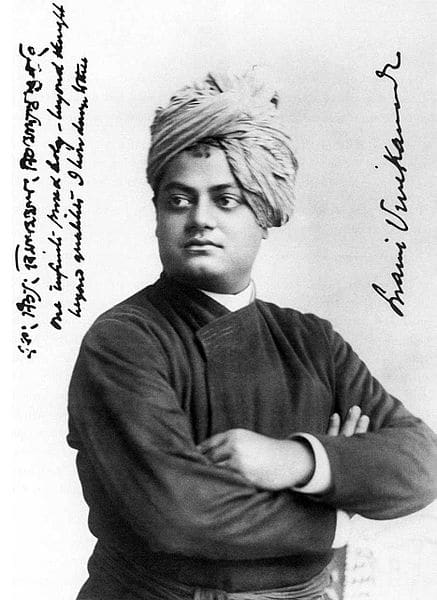Swami Vivekanada was born in 1863 into an aristocratic Bengali family and was heavily influenced by his guru Ramakrishna while he taught concepts and philosophies of Hinduism around the world. He was a charismatic and well-known man who traveled the world speaking on Hinduism and bringing its form of spirituality to the west. He was spiritual from childhood and continued to become one of the most influential Hindu speakers in India, but throughout his life he focused his mind on god. Throughout the beginning of the 19th century he toured India teaching Hinduism and intercultural awareness to his fellow Indians and later he would teach the concepts of Hinduism to the western world until he died in 1903 at 39.
Vivekananda was born Narendranath in Calcutta. His mother’s religious attitude and father’s rational attitude helped to form his thinking until he began his tutelage under after a lecture from William Hastie. Ramakrishna a mystic and yogi who pledged himself to Ma Kali, but experienced samadhi and followed a path towards the Hindu concept of Moksha in service to others, the philosophy which Vivekanada also followed. However, Vivekanada did oppose Ramakrishna’s idol worship, polytheism, and obsession with Kali. After renouncing everything following his father’s death and the bankruptcy of his family his took up Ramakrishna as his guru in the pursuit of realizing god.
Ramakrishna died in 1886 and after his death Vivekanada founded a new monastery in the memory of his old guru. The disciples would spend hours in meditation and practicing rituals each day and eventually Vivekanada and eight other disciples swore religious vows to live as Ramakrishna had and Narendra changed his name to Swami Vivekanada. He continued to travel teaching as he went.
There is no doubt that Swami Vivekanada was an excellent public speaker. He is probably best known for this speech to the Parliament of World Religions where he called Americans brothers and sisters to a tremendous uproar of approval. He traveled through the western and eastern world and eventually claimed to be a new buddha to the west. He traveled around the world for fourteen years speaking on Hinduism, meditation, and founding monasteries and ashrams.
Swami Vivekanada’s health began to decline in 1899 when he developed insomnia, diabetes, and asthma. He died in 1902 after meditating for several hours that day and died while meditating, after the rupturing of a blood vessel in his brain. After his death, Vivekanada is recognized for revitalizing Hinduism inside and outside of India, in particular his doctrine that each living being is divine. He also stated that all paths within Hinduism lead to the same goal, but some view this as oversimplified.
Vivekanada was an excellent writer and produced songs, poems, lectures, and other forms of art. His influence allowed the printing of over 19 books, some published posthumously. He wrote on everything in Indian culture from defying the caste system to treating all other people as brothers. He was a powerful figure in modern Hinduism and Indian nationalism and helped to pave the way for yoga to later become a powerful influence in the West.

